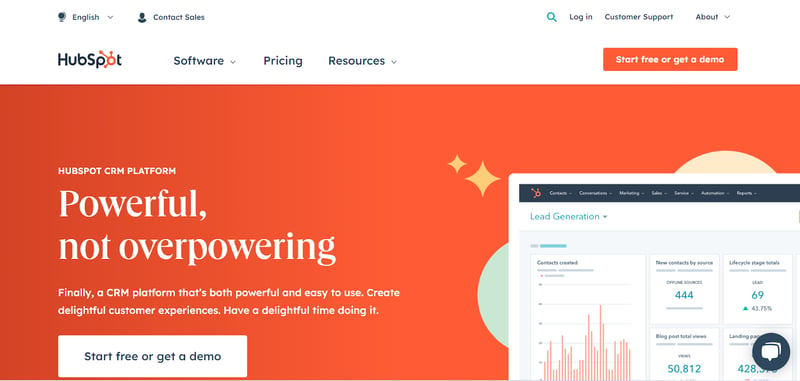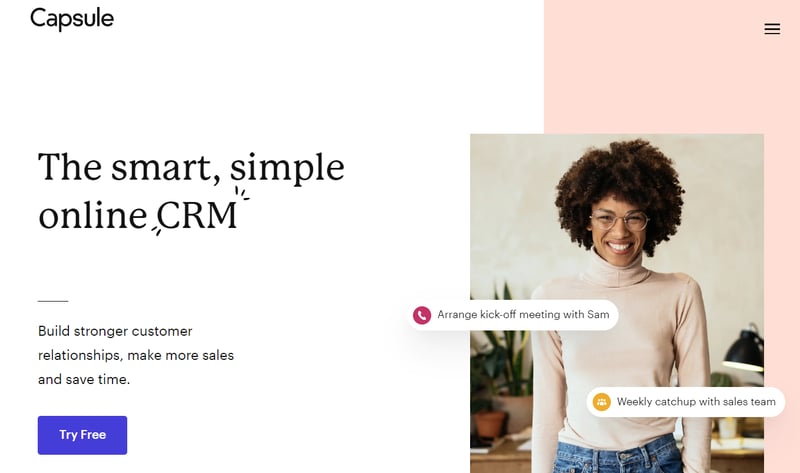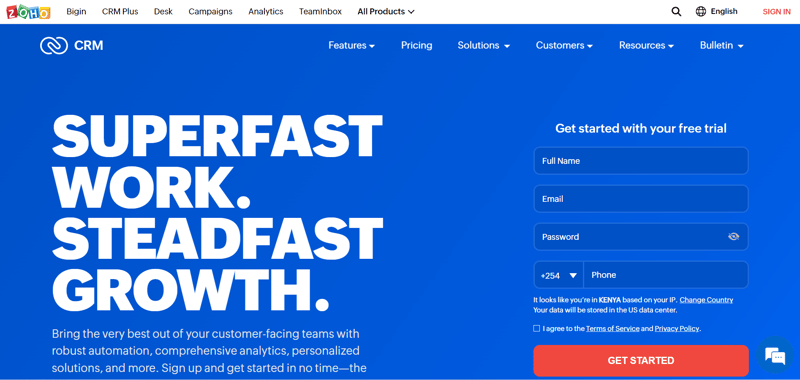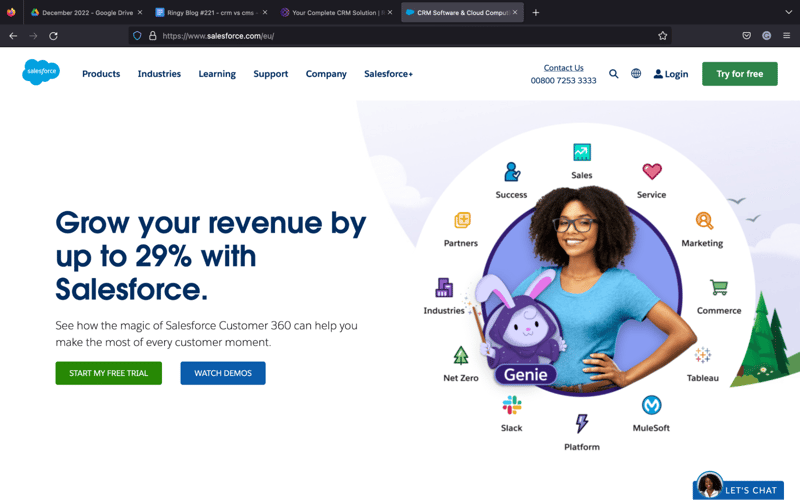Table of Contents
Table of Contents
The increasing complexity and nuances involved in today's business world make it an evolving space that's challenging to navigate. To stand out from the plethora of companies, it's important to create a unique user experience with the best CRM and project management software.
Creating a solid CRM project management strategy has never been more essential. Remote sales companies, insurance agencies, SaaS startups, creative firms, and lawyers can utilize CRM systems to gain a competitive advantage.
Organizations must consolidate internal processes as client expectations rise and various sectors become more competitive. Developing a customized client experience is quintessential!
Consolidating business tasks is key to maintaining an equilibrium between staff and customer satisfaction.
This CRM project management article shows you what a sales project management CRM is, how to choose the best CRM for project management, different types of CRM project management software, and why to use a sales CRM with project management capabilities.
What Is Sales Project Management CRM?
CRM project management is the monitoring of marketing or sales processes to improve the customer's experience. Once behavioral sales tracking and easier communication is enabled for all parties, there'll be an increase in client retention rates.
So you may be wondering, “What tasks are made simpler with CRM project management?” With a CRM system, marketing campaigns, product releases, and internal projects can be completed timeously. If deadlines aren't met, your customer's trust levels may take a knock.
In a nutshell – CRM and project management go together like bread and butter. The data received from the amalgamation offer unique methods to learn about and appease prospects.
Deploying CRM project management into your business model can provide the following benefits:
- Records customer information in one place
- Allows the mining of data to ameliorate deliverables
- Creates strategic alignment between customer service departments, sales teams, and project management crews
- Provide insights into where the customer is in the sales pipeline
- View client activities while working on a project
- Execute projects immediately after sales occur
- Bring patrons to the software
- Promote quality control by letting clients view and approve deliverables
Let's take for example a small organization selling technologically advanced kitchen appliances. The business's marketing team has built a solid knowledge base with guides on how to set up these products.
However, there was an issue that wasn't covered – troubleshooting. The CRM the enterprise adopted allows it to see the concerns expressed on specific products. That led the team to create more tutorials on resolving the issues clients were experiencing with the appliances.
These articles were given to the customer service team so they could email tutorials while on tech support calls. The CRM project management team kept track of all received content and sent follow-up messages to ask for feedback.
Additional positive reviews and an improved company reputation were the chief benefits accomplished by the business after implementing CRM project management.
Features of a Sales CRM for Project Management

Not only does a CRM platform help manage contacts and act as a digital ledger of customer information but offers features that drive sales. Maintaining customer loyalty and nurturing leads to close the deal are prime reasons business owners love using CRM technology.
Below are seven attributes to look for in CRM project management software:
Personalization
No two companies are alike, and rightfully so. That's why choosing the correct CRM project management software that caters to your enterprise's unique requirements is vital.
Some CRM project management platforms let you adjust basic fields, such as creating custom reports, selecting which information is displayed on the dashboard, and adding contact fields. Other applications allow you to pick the features you wish to include in the CRM package.
There are also many add-ons, plugins, and extensions added to bolster the CRM program's capabilities.
To truly tailor CRM to your company, APIs (Application Programming Interfaces) can be utilized to gain access to advanced features. APIs also allow businesses to integrate with native software they already use.
Multiple Pipelines
Managing clients and leads in the entire sales funnel is an excellent feature to look for in a CRM system. Detailed filtering can be applied by using colors or tags to differentiate between various stages in the pipeline.
With the ability to drag and drop prospects from one stage to another, company owners can effectively manage their leads.
Traditional sales pipeline management software generally only has one funnel. This can be catastrophic to businesses with many pipelines for different lead sources, products, or countries.
Here's a useful tip: Search for CRM project management software that allows you to label customers and leads while segmenting them for categorization purposes.
Below are other demographics you could separate customers into
- Retention
- Device
- Language
- Location
- Age
- Interests
By including custom tags for every prospect, it's easier to create more appropriate marketing material for each one.
Sales Dashboard
If you want a quick overview of a company's monthly sales results, a KPI (Key Performance Indicator) dashboard is the best way to monitor it. You can add key performance indicators, charts, and graphs to the user interface to immediately notice sales performance trends.
Here are seven commonly utilized metrics in CRM project management:
- Net promoter score
- Customer turnover rate
- Monthly new leads or prospects
- Client lifetime value
- Cost per conversion
- Lead to sale conversion rate
- Cost per lead
- Monthly sales or new customers
This information is useful to the sales team and gives them an expeditious rundown of the business's monthly or weekly performance.
Task Management
Having multiple enterprise tasks huddled together in a single location is a fantastic way to increase efficiency. Emailing and calling from the same system allows the project manager to monitor the progress of a specific assignment.
Company owners can set tasks and track what is required throughout the entire customer journey.
Prospect profiles and employee duties are linked to make locating all relatable data a breeze. Everything you're meant to inform or deliver to the client is displayed on the system before communication commences.
Real-Time Data
A long time ago, in 2017, real-time data became a primary driving factor in implementing CRM project management. The ability to extract and showcase real-time information from appliances, applications, and devices made these platforms highly sought after.
Below are four advantages of utilizing concurrent data:
- You can determine which services and products generate the most income
- Identify which areas of interest require a boost in exposure
- Real-time data helps businesses make more intelligent marketing decisions about placement and bidding price of online advertisements
- With on-the-spot market demand insights, you can adjust your plan to produce a better outcome
Shared Calendar
Choosing a CRM project management software that includes a shared team calendar makes your sales employee's job simpler and more efficient.
A built-in calendar is perfect for managing schedules, resources, meetings, and events. Client profiles can quickly be linked to the conference call, so it's easier to see when and who is involved in the gathering.
Scheduling features can help all parties find an appropriate meeting time correlating with their working hours. Instead of back-and-forth email communication, many dates and times can be proposed so that all participants can select a suitable time.
A confirmation email is sent out once a date and time are set. Clients are added to the sales employee's calendar with a few clicks.
Other CRM Project Management Features
Besides some of the primary benefits of CRM project management software, countless other advantages can change how businesses are run. These features make a good CRM project management solution:
- Streamlined communication
- Sales pipeline management
- Visual revenue predictions
- Portfolio management
- Document and data maintenance
- Customer collaboration
- Customizability
- Ease of use
- Social media integration
- Third-party APIs
- Lead management tools
A CRM project management platform can be a helpful tool for companies irrelevant of their size. However, locating a system that can grow with your business's requirements is crucial. If you look for these features before purchasing a CRM application, the implementation process becomes straightforward.
Pros and Cons of Combining CRM and Project Management
The decision to combine CRM and project management depends on a business's specific needs and preferences. While the integration offers numerous advantages, businesses should carefully weigh the potential cons. Fortunately, we do just that below for you.
|
Pros |
Cons |
|
Combining CRM and project management allows for centralized data management, ensuring all customer-related and project-specific information is easily accessible and organized. |
All-in-one systems might have a steeper learning curve as users need to familiarize themselves with CRM and project management functionalities, potentially leading to a longer onboarding process. |
|
Users can seamlessly access customer account information alongside project details and notes, providing a holistic view. This integration enhances collaboration and decision-making by presenting relevant data in one interface. |
Cost implications may arise if additional training or support is needed to ensure all users can efficiently navigate and leverage the integrated system. |
|
Utilizing a single tool for CRM and project management can lead to significant time and cost savings. Businesses benefit from reduced software costs, streamlined processes, and minimized data silos. |
The cost of more feature-rich systems might be higher initially, impacting the budget. However, the long-term efficiency gains may offset the initial investment. |
|
Integration promotes collaboration among teams by enabling them to work within the same system. Sales, customer service, and project teams can share real-time information, fostering a more cohesive work environment. |
Integrating all-in-one systems with existing software infrastructure may pose challenges, especially if customization or integration with other tools is required. |
|
Combined systems offer comprehensive reporting capabilities, allowing businesses to generate insights that span customer interactions and project progress. |
Businesses must carefully assess their requirements as opting for overly complex systems may result in unnecessary features, leading to a more intricate interface and potentially unused functionalities. |
Why Use a Sales CRM with Project Management Capabilities

Without improving customer experiences, businesses struggle to stay aligned with modern-day client satisfaction best practices. It's essential to look at the advantages and disadvantages of utilizing a CRM project management tool for your organization:
|
CRM Project Management Advantages |
CRM Project Management Disadvantages |
|
Data entry automation |
Time-consuming data entry |
|
Streamlining sales activities |
Requires a CRM implementation strategy |
|
Potential to increase monthly earnings |
Focuses on sales managers, not staff |
|
Team collaboration made easy |
Can be pricey |
|
Repetitive tasks are handled automatically |
Incorrect CRM implementation can hinder performance |
|
A CRM can grow with your business |
Additional extensions, plugins, or APIs may be required |
As you can see, by correctly implementing a CRM project management platform into your business, it can grow exponentially. Please consider the pros and cons of using a sales CRM with project management capabilities before embarking on the implementation journey.
Types of Sales Project Management Software CRM

CRM applications make up a huge portion of the software market. Organizations are competing to win clients, so it's no wonder these applications have become so prominent. CRM software comes in many different forms making it easy to amalgamate into any enterprise or small business.
Five types of CRM systems exist, namely:
- Strategic
- Campaign management
- Collaborative
- Analytical
- Operational
Let's deep dive into what these types of project management CRM software are so that you can get a better understanding of the possibilities of each. Please note: Some CRM allows users to create customizable applications more suitable for their company's requirements.
Strategic CRMs
With a strategic CRM, the primary focus is on clients. These systems can be used for patron interaction and information collection to create a superior customer experience. Improved supporter relationships, higher clientele retention rates, and in-depth communication insights make strategic CRM project management software a must-have for savvy business owners.
You can use the in-depth information to customize or adjust future customer interactions. These solutions are exceptionally useful if long-term relationships are the core enterprise focus.
Campaign Management CRMs
Operational or analytical are the two words that often describe campaign management CRMs. This software combines both features by letting enterprise owners gain insights and customer data to incorporate into sales or marketing efforts.
However, it's important to determine the CRM program you require. Suppose your goals include managing, planning, and analyzing data; a campaign management CRM may be the best option.
Another incredible thing about these systems is that they integrate with various third-party email outreach tools.
Collaborative CRMs
Imagine the ability to share information about clients with various team members of your organization. With collaborative CRMs, this process is now possible!
The emphasis of collaborative CRM project management is customer service.
You can exchange data between marketing, sales, and support departments. In most cases, these sections work individually, which makes customer relationships and communications more challenging.
Managing clients becomes simpler when utilizing these CRM systems to record and share their information.
Analytical CRMs
Customer data can be broken down by companies using analytical CRMs in their business model. Here are three segmented areas that benefit company owners who deploy an analytical CRM project management tool:
- Displays points of interest
- Shows lead or client channels
- Records customer preferences
These customer relationship management platforms help organization proprietors understand the client before adding them to the sales pipeline.
Once customer credentials are collected, further data is mined to provide deep insights into trends and buying patterns. That allows enterprises to make more adroit business decisions with previously gathered statistics.
Operational CRMs
Existing and potential customers are supported using an operational CRM. Customer services, sales, and marketing departments will have all the information they need at their fingertips.
Creating conventional procedures and structured data for your clients within the CRM project management platform is crucial. Automating the following business processes is the primary reason company owners love using this type of CRM:
- Service automation
- Marketing automation
- Sales automation
Computerization allows various divisions to work together, recording, looking after, and maintaining prospect relationships. Operational CRMs let you move clients through the sales funnel and close more deals.
Constantly updated data within a single tool allows businesses to operate more efficiently. There are also minimal chances of miscommunications or losing sales due to inaccurate information and human error.
Best Sales CRM Project Management Software
After learning all the ins and outs of CRM project management software, it only makes sense that you'd want to check out the top-rated ones. This section is dedicated to the applications that make your job convenient and highlights their features.
Ringy
.png?width=800&height=361&name=Ringy%20(1).png)
Ringy is developed to enhance performance while supporting sales teams. The software has world-class features that integrate with third-party applications to improve various aspects of your business.
This CRM project management platform is popular because of its easy-to-use dashboard and analytical tools.
|
Contemplation |
Rating out of 10 |
|
Available features |
10/10 |
|
Intuitive user interface |
10/10 |
|
7/10 |
|
|
Automation practicality |
10/10 |
|
SMS and call features |
10/10 |
|
Sales pipeline management |
10/10 |
|
Pricing |
$109 monthly |
*Pricing as of November 2023
This CRM project management platform is ideal for those who have realized that a free CRM won't work. Ringy has all the power required to handle sales and marketing tasks so your business operates more efficiently.
HubSpot

If your company specializes in inbound sales and marketing, HubSpot may be the ultimate solution. The software is easily one of the most commonly utilized CRMs by startups because of the number of tools it contains.
HubSpot's core features are live chats, bot communications, deal tracking, website activity monitoring, and email marketing functionality. Let's look at a breakdown of ratings and considerations before deciding if this CRM project management system is worth it.
|
Contemplation |
Rating out of 10 |
|
Available features |
8/10 |
|
Process automation |
0/10 |
|
Third-party amalgamation |
4/10 |
|
8/10 |
|
|
Sales pipeline maintenance |
6/10 |
|
SMS and calling options |
2/10 |
|
Pricing |
From $30/month to $1,781/month |
*Pricing as of November 2023
HubSpot is the ideal application for your business if you're a small organization getting started with inbound marketing and sales. Give the free trial a shot and discover how this innovative CRM project management system works!
Capsule CRM

Utilizing intuitive CRM project management software allows you to remove features that small enterprises don't require. Capsule CRM is built to help startups manage their contacts while offering additional attributes for better communications.
With the Capsule CRM project management software paid plan, you'll receive up to 40GB of storage, superior customer support, up to 200,000 contacts, and advanced reporting tools. Here are some things to consider before choosing this CRM as your preferred option:
|
Contemplation |
Rating out of 10 |
|
Available features |
8/10 |
|
Automation options |
2/10 |
|
Integration with third-party applications |
4/10 |
|
Intuitiveness |
10/10 |
|
Sales pipeline tracking |
8/10 |
|
SMS and calling features |
0/10 |
|
Pricing |
From $21 to $75 per user per month. |
Small agencies searching for CRM with a slight learning curve and awesome features should look no further than this platform.
*Pricing as of November 2023
Zoho CRM

Zoho CRM is a comprehensive customer relationship management platform that seamlessly integrates project management functionalities. It is renowned for its user-friendly interface and robust features, making it a popular choice for businesses of all sizes.
Like the first three options, let's see how Zoho delivers when it comes to its features.
|
Contemplation |
Rating Out of 10 |
|
Features |
9/10 |
|
Interface |
8/10 |
|
Integrations |
9/10 |
|
Automation Practicality |
8/10 |
|
SMS and Call Features |
7/10 |
|
Sales Pipeline Management |
9/10 |
|
Pricing |
From $18 to $55 per user per month. |
*Pricing as of November 2023
Salesforce

Salesforce is a powerful CRM platform that incorporates robust project management capabilities. It is renowned for its scalability and customization options, making it suitable for businesses with diverse needs. So, how capable is Salesforce when it comes to project management? We conducted an in-depth research of its features, and here's what we concluded.
|
Contemplation |
Rating Out of 10 |
|
Features |
10/10 |
|
Interface |
8/10 |
|
Integrations |
10/10 |
|
Automation Practicality |
9/10 |
|
SMS and Call Features |
8/10 |
|
Sales Pipeline Management |
10/10 |
|
Pricing |
From $25 to $330 per user per month. |
*Pricing as of November 2023
FAQ

What Questions Would I Ask to Determine if my Business Requires CRM Project Management?
There are various questions business owners should answer before embarking on a CRM implementation journey. Here are the most common queries to consider:
- Does my company need a CRM platform?
- Is my business ready for CRM tools?
- How much does a CRM cost?
- What details should I track?
- How do I choose the best CRM and project management software?
- What features do I require?
Considering these attributes can help you make an informed decision when deploying your first CRM system.
What Are the Five Phases of CRM Project Management Implementation?
Once the CRM program has been running for a few months, you can evaluate its success by analyzing different areas of interest. Follow these exact steps to implement CRM software in your company:
- Create a CRM strategy
- Build a base for your CRM project management escapades
- Staff education and CRM champion selection
- Implement the CRM
- Assess performance
After successful implementation, you can make necessary changes to keep up with client or employee demands. Speak to your staff and find out if everyone is on the same page regarding adopting the new system.
What Is a CRM Strategy?
A customer relationship management strategy aims at putting the client first. It's an organization-wide plan to grow a company, improve patron relationships, reduce costs, and increase profits.
Conclusion
CRM project management implementation utilizes a CRM system to maintain all customer relationships. The software allows sales teams to move clients through the pipeline while remaining in correlation with the consumer's needs.
Deploying a CRM into your business can be challenging, but with a well-thought-out plan, it becomes simpler. If you want to increase your brand's overall credibility and boost sales, you should check out an all-in-one CRM!
Ringy is a CRM platform with multiple unique features to keep you ahead of customer expectations. The application allows you to store and track client communications, making customizing outreach business messaging more personal.
You'll never be confused about a patron's status ever again! Don't you think the time has come to sign up for the Ringy demo to experience this innovative application firsthand?

Skyrocket your sales with the CRM that does it all.
Calling? Check. SMS? Check. Automation and AI? Check. Effortlessly keep in touch with your customers and boost your revenue without limits.

Take your sales to new heights with Ringy.
Sales in a slump? Ringy gives you the tools and flexibility you need to capture leads, engage with them, and turn them into customers.
Subscribe to Our Blog
Enter your email to get the latest updates sent straight to your inbox!
Categories
Related Articles







































































































